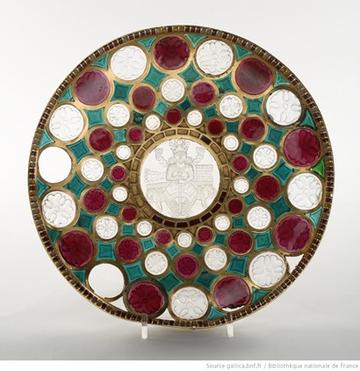
So-called Solomon's Cup, made for a Sassanid king, 6th c. AD (Gallica.bnf.fr)
‘Kosmokrator: the origins of the iconographic tradition, between East and West’
Anca Dan (CNRS, Paris Sciences & Lettres)
Beyond the image of Christ Kosmokrator at San Vitale, the history of the notion of "master of the world" can be reconstructed from texts and images, going back to Egypt and the ancient Asiatic empires. In the Judeo-Christian theology, however, the Kosmokrator is a later designation and representation than the Pantokrator – the All-Mighty God, Sabaoth and El Shaddai in the Septuaginta, and the Christ in majesty, lawgiver and enthroned emperor, depicted in churches from the 4th century AD onwards. The Kosmokrator’s mark is the kosmos, which the Greeks and their followers represented by the celestial globe. The kosmokratoria goes back to the Hellenistic times, Alexandria-by-Egypt (the first kosmopolis) and Alexander the Great’s legend. It was promoted in political and religious contexts, in the Roman as well as in the Sassanian empires. In this paper, we discuss the origins of the notion: first, we refer to Alexander the Great, represented as a celestial ruler and called kosmokrator in his Romance; he was the figure beyond the first cosmography, that we date to the end of the 1st century BC and the beginning of the 1st century AD. Second, we recall the evidence of the Roman emperors-kosmokratores, winners, bearers of globes and finally gods through apotheosis. Lastly, we bring into discussion the Iranian evidence of the Great Kings, who could represent themselves as universal rulers – as one can see on the so-called cup of Solomon or of Chosroes. This paper aims to show that although Greek by its name and expressions, the notion of kosmokrator can be rightly understood only by bringing together the Eastern and the Western testimonies.
Anca Dan (https://cv.archives-ouvertes.fr/anca-dan) is associated research professor in the French National Centre for Scientific Research at the École Normale Supérieure, University Paris Sciences and Letters. She focuses on historical geography, the ancient representations of the world and the cultural contacts which shaped the Hellenic culture.
The Late Antique and Byzantine Seminar is convened by Ine Jacobs (University College), Marc Lauxtermann (Exeter College) and Ida Toth (Wolfson College), in collaboration with Olivier Delouis (MFO).